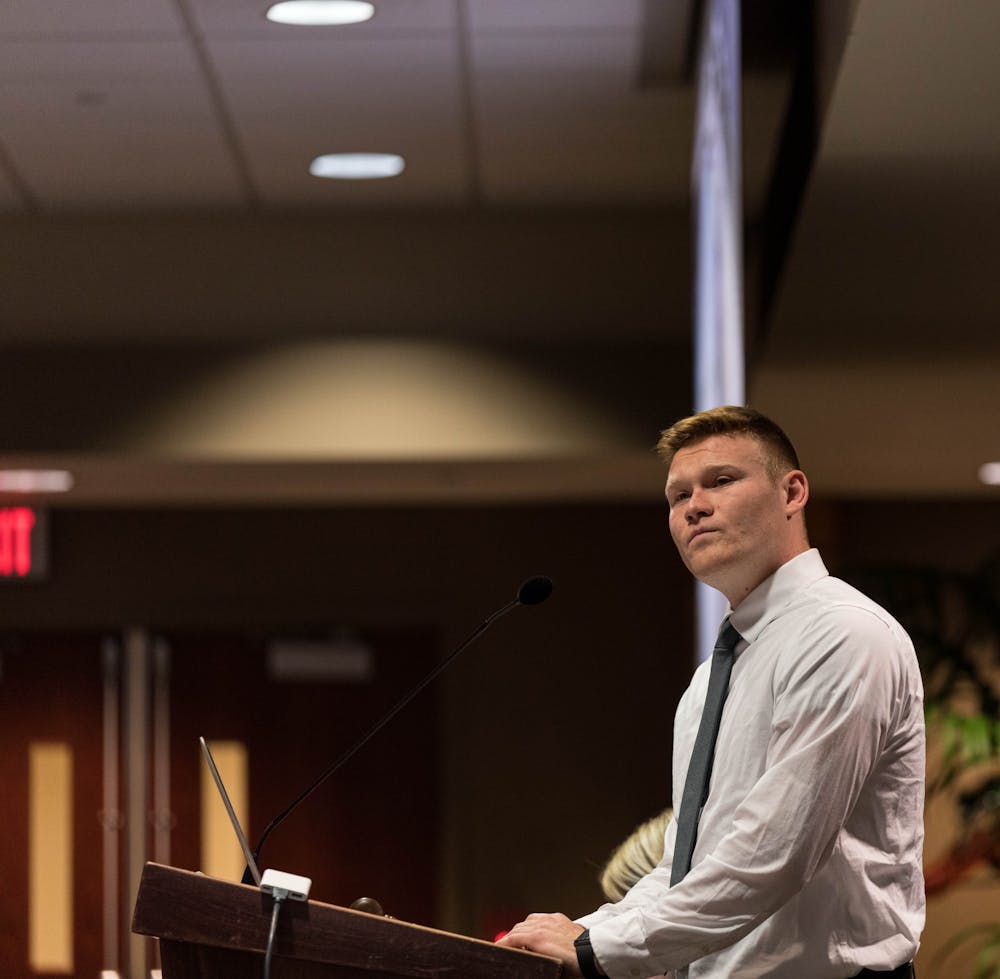On Wednesday April 6, Ball State’s Student Government Association (SGA) elected their President Pro Tempore.
The three candidates running for President Pro Tempore were Senators Trent Mckenzie, Riley Wert and Bandith Carr.
Mckenzie is the current chair of the Collegiate Caucus and the Academics Affairs Committee, Wert is the current chair of the Organizational Caucus and Carr has served on the Agenda Committee for two years.
All three candidates focused on improving SGA’s recruitment and retention of senators and on SGA’s advertising. Car and Mckenzie both brought up the need for making Ball State and SGA more inclusive for all abilities.
“First, I would like to sponsor legislation to make campus organizations and events more inclusive to people of all abilities, “ Carr said. “I'm currently working on a project examining ways to make delegating things … more accessible and inclusive. ”
Mckenzie’s plan for growing SGA was to reach out to hall councils to get the list of students who ran for the SGA representative position that weren’t elected and to personally reach out to them to join another caucus, along with tabling and canvassing around campus.
Wert focused on growing the Collegiate Caucus and the Off-Campus Caucus. Sen. Jackson Phenis asked about filling the missing seats in the On-Campus Caucus.
“I would love to do that,” Wert said. “I think it's also important, I guess I kind of didn't realize that you guys still had missing seats.”
The fact that Carr is currently an online student raised concerns in the senate. Another concern for all three candidates was how they would balance their schedules, especially since all three are involved in other organizations outside of SGA.
Wert was elected President Pro Tempore for the 2022-2023 school year with 16 votes. Mckenzie had 12 votes and Carr had one vote.
The amendment on changing the time frame on elections for the President Pro Tempore, introduced March 30, was voted on. The amendment proposed that nominations should happen in March and the elections should happen in the month of March or April, with specific dates not listed.
This amendment had another amendment proposed to it, to just make elections happen in the month of March. The amendment to the amendment passed with a two-thirds majority.
The original amendment passed 29-3 with one abstention.
Four amendments were introduced and a resolution was re-introduced. The resolution was previously introduced March 16.
The resolution proposed to have more gender-inclusive bathrooms at Ball State. The resolution calls for all Ball State buildings to have at least one gender inclusive bathroom, which currently is not the case.
Cost concerns were brought up about having these new bathrooms. Sen. Brenna Large, co-author of the resolution, said that Ball State’s Facilities and Management are already working on putting in gender-inclusive bathrooms in some buildings. If passed the resolution would ensure that all buildings have bathrooms.
Related: SGA votes on organization and residence hall representation, introduces gender-inclusive bathroom resolution
The four amendments introduced were about changing the amount of student signatures for resolutions and senator applications and fixing the governing documents.
The first amendment proposed to update and fix SGA’s governing documents to reflect this year's legislation.
The second amendment proposed to rename the Governmental Affairs and Community Advancement Committee (GACA) and update the language surrounding GACA. If passed, the committee would be renamed to the Governmental Relations Committee.
This amendment proposed that GACA would no longer work with University Senate representatives and instead work with Ball State’s office of Governmental Relations.
The third amendment proposed a minimum of 100 student signatures for resolutions introduced in SGA.
The fourth amendment proposed a minimum of 50 student signatures for senator applicants in the Off-Campus and At-Large Caucuses. On-Campus is excluded from this because they are elected by their residence halls.
This amendment also proposed that applicants for the Collegiate Caucus would require 50 student signatures and three professor signatures in their respective college or they could get the signature of their dean of their respective college.
These four amendments and the resolution will be voted on at the next meeting, April 13.
Contact Hannah Amos with comments at hannah.amos@bsu.edu or on Twitter @Hannah_Amos_394.





The Daily News welcomes thoughtful discussion on all of our stories, but please keep comments civil and on-topic. Read our full guidelines here.